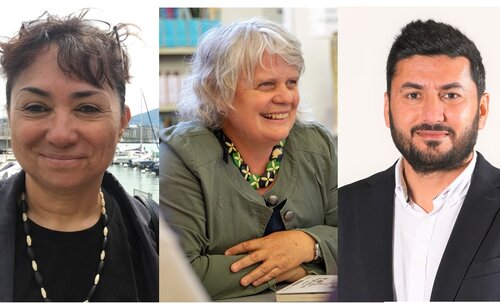Source: University of Waikato
University of Waikato Vice-Chancellor Professor Neil Quigley has announced academic promotions for one new Professor and 15 Associate Professors.
These promotions recognise contributions to research and the achievement of an international reputation in areas of specialisation, as well as outstanding contributions to teaching, research, student supervision and leadership within the University.
Promotion to Professor
Professor Valmaine Toki (Ngātiwai, Ngāpuhi), Te Piringa – Faculty of Law
Valmaine’s research and teaching lies within the area of Indigenous rights. Her 2017 book, Indigenous Courts, Self-Determination and Criminal Justice, focuses on her recent research within the area of recognition and implementation of Indigenous rights. Valmaine was the first New Zealander appointed to the UN Permanent Forum on Indigenous Issues.
Promotion to Associate Professor
Dr Leandro Bolzoni, School of Engineering
Leandro’s main research field is in physical metallurgy of light metals, in particular the development or improvement of the sustainability of light metals like titanium, aluminium and magnesium via non-traditional fabrication methods.
Dr Nicholas Cavenagh, Rorohiko me ngā Pūtaiao Pāngarau – School of Computing and Mathematical Sciences
Nick’s research is in combinatorial design theory, which focuses on the theory behind the mathematical structures used to maximise efficiency in the design of statistical experiments. This includes arrays like Latin squares, where each entry occurs once in every row and column, as in a Sudoku puzzle.
Dr Nicola Daly, Te Kura Toi Tangata – School of Education
Nicola’s research area brings together her background in sociolinguistics and children’s literature. Her work explores multilingualism and language hierarchies in children’s picturebooks, recognising the power of this often underestimated format in the development of language attitudes and the perpetuation of hegemonies.
Dr Ian Duggan (Ngāi Tahu), Te Aka Mātuatua – School of Science
Ian’s primary interests are invasion biology and zooplankton ecology. In particular, he is interested in the exploration of biological invasion vectors and pathways responsible for transportation of species at global or finer scales.
Dr Adam Hartland, Te Aka Mātuatua – School of Science
Adam’s research interests are based around the application of nanoscience to the study of past climate, biogeochemical cycles and environmental pollution. In particular, he has focused on developing new, quantitative climate proxies from speleothems (cave carbonates) in order to extend the short instrumental records currently available.
Dr Robert Joseph (Tainui, Tūwharetoa, Kahungunu, Rangitāne, Ngāi Tahu), Te Piringa – Faculty of Law
As the Director of the Māori and Indigenous Governance Research Centre, Robert’s research interests include the realisation of Treaty of Waitangi rights and responsibilities, rights and responsibilities of Indigenous groups, appropriate dispute resolution between different cultures, and excellent Māori and Indigenous Peoples governance.
Dr Gohar Khan, School of Management and Marketing
Gohar’s interest lies in contributing to a deeper understanding of user perceptions of technology and data-driven business decision-making. His research has challenged existing understanding of human technology adoption to build novel theoretical frameworks for the use of autonomous artefacts that do not require human intervention.
Dr Bridgette Masters-Awatere (Te Rarawa, Ngatikahu ki Whangaroa, Ngāi te Rangi, Tūwharetoa ki Kawerau), Te Kura Whatu Oho Mauri – School of Psychology
Bridgette explores issues in Māori psychological, social and cultural health. Her specific interest is in how health development and wellbeing measures for Māori have been applied through evaluation research. This includes public health, hospitals, uptake, implementation and systems engagement.
Dr Julia Mullarney, Te Aka Mātuatua – School of Science
Julia’s primary research interests are coastal ocean dynamics, sediment transport, and ecohydraulics. Her work has a particular emphasis on combining unique data from field experiments with numerical and theoretical analysis, to understand key dynamics of environmental systems across multiple temporal and spatial scales.
Dr Sophie Nock (Ngāti Kurī), Te Pua Wānanga ki te Ao – Faculty of Māori and Indigenous Studies
Sophie’s primary research interests are in the teaching and learning of te reo Māori and the language revitalisation agenda. More recently, she has developed interests in community research, including kaumātua health, wellbeing and housing, and concussion and recovery among young adolescents.
Dr Fiona Petchey, Te Aka Mātuatua – School of Science
Fiona’s research centres on the interpretation of radiocarbon dates of animals that uptake carbon from both marine and terrestrial sources. By investigating the interaction between natural ecosystems and human economies, she has tackled some of Pacific archeology’s most difficult chronological problems.
Dr Maree Roche (Ngāti Raukawa), School of Management and Marketing
Maree’s teaching and research is centred around leadership in organisations. It particularly examines the psychological and organisational influences and outcomes of leaders’ mindsets and the implications of these for organisational engagement and growth.
Dr Silvia Serrao-Neumann, Te Kura Aronui – School of Social Sciences
Silvia is the convenor for the Environmental Planning Programme. Her research focuses on climate change adaptation, urban and regional planning, community planning for disaster recovery and resilience, scenario planning and water-sensitive cities.
Dr Sashi Sharma, Te Kura Toi Tangata – School of Education
Sashi’s research is in the intersection of mathematics and statistics, with a particular focus on linguistic and cultural issues in the teaching and learning of mathematics and statistics. Most recently she has become interested in how teachers use language in teaching mathematics and statistics, and how students use language to think about mathematics and statistics.
Dr Paresha Sinha, School of Management and Marketing
Paresha researches at the intersection of international business, strategy, and international entrepreneurship domains. In particular, she examines strategies and practices adopted by foreign and local firms in emerging markets.



